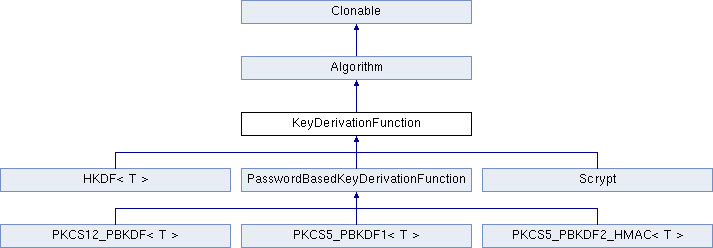Interface for key derivation functions. More...
#include <cryptlib.h>
 Inheritance diagram for KeyDerivationFunction:
Inheritance diagram for KeyDerivationFunction:Public Member Functions | |
| virtual std::string | AlgorithmName () const =0 |
| Provides the name of this algorithm. More... | |
| virtual size_t | MinDerivedKeyLength () const |
| Determine minimum number of bytes. More... | |
| virtual size_t | MaxDerivedKeyLength () const |
| Determine maximum number of bytes. More... | |
| virtual size_t | GetValidDerivedLength (size_t keylength) const =0 |
| Returns a valid key length for the derivation function. More... | |
| virtual bool | IsValidDerivedLength (size_t keylength) const |
| Returns whether keylength is a valid key length. More... | |
| virtual size_t | DeriveKey (byte *derived, size_t derivedLen, const byte *secret, size_t secretLen, const NameValuePairs ¶ms=g_nullNameValuePairs) const =0 |
| Derive a key from a seed. More... | |
| virtual void | SetParameters (const NameValuePairs ¶ms) |
| Set or change parameters. More... | |
 Public Member Functions inherited from Algorithm Public Member Functions inherited from Algorithm | |
| Algorithm (bool checkSelfTestStatus=true) | |
| Interface for all crypto algorithms. More... | |
| virtual std::string | AlgorithmName () const |
| Provides the name of this algorithm. More... | |
| virtual std::string | AlgorithmProvider () const |
| Retrieve the provider of this algorithm. More... | |
 Public Member Functions inherited from Clonable Public Member Functions inherited from Clonable | |
| virtual Clonable * | Clone () const |
| Copies this object. More... | |
Detailed Description
Interface for key derivation functions.
- Since
- Crypto++ 7.0
- See also
- KeyDerivationFunction on the Crypto++ wiki
Definition at line 1522 of file cryptlib.h.
Constructor & Destructor Documentation
◆ ~KeyDerivationFunction()
|
inlinevirtual |
Definition at line 1525 of file cryptlib.h.
Member Function Documentation
◆ AlgorithmName()
|
pure virtual |
Provides the name of this algorithm.
- Returns
- the standard algorithm name
Reimplemented from Algorithm.
Implemented in HKDF< T >, PKCS5_PBKDF1< T >, PKCS5_PBKDF2_HMAC< T >, PKCS12_PBKDF< T >, and Scrypt.
◆ MinDerivedKeyLength()
|
virtual |
Determine minimum number of bytes.
- Returns
- Minimum number of bytes which can be derived
◆ MaxDerivedKeyLength()
|
virtual |
Determine maximum number of bytes.
- Returns
- Maximum number of bytes which can be derived
Reimplemented in HKDF< T >, PKCS5_PBKDF1< T >, PKCS5_PBKDF2_HMAC< T >, PKCS12_PBKDF< T >, and Scrypt.
◆ GetValidDerivedLength()
|
pure virtual |
Returns a valid key length for the derivation function.
- Parameters
-
keylength the size of the derived key, in bytes
- Returns
- the valid key length, in bytes
Implemented in HKDF< T >, PKCS5_PBKDF1< T >, PKCS5_PBKDF2_HMAC< T >, PKCS12_PBKDF< T >, and Scrypt.
◆ IsValidDerivedLength()
|
inlinevirtual |
Returns whether keylength is a valid key length.
- Parameters
-
keylength the requested keylength
- Returns
- true if the derived keylength is valid, false otherwise
Internally the function calls GetValidKeyLength()
Definition at line 1548 of file cryptlib.h.
◆ DeriveKey()
|
pure virtual |
Derive a key from a seed.
- Parameters
-
derived the derived output buffer derivedLen the size of the derived buffer, in bytes secret the seed input buffer secretLen the size of the secret buffer, in bytes params additional initialization parameters to configure this object
- Returns
- the number of iterations performed
- Exceptions
-
InvalidDerivedKeyLength if derivedLenis invalid for the scheme
DeriveKey() provides a standard interface to derive a key from a secret seed and other parameters. Each class that derives from KeyDerivationFunction provides an overload that accepts most parameters used by the derivation function.
the number of iterations performed by DeriveKey() may be 1. For example, a scheme like HKDF does not use the iteration count so it returns 1.
Implemented in HKDF< T >, Scrypt, PKCS5_PBKDF1< T >, PKCS5_PBKDF2_HMAC< T >, and PKCS12_PBKDF< T >.
◆ SetParameters()
|
virtual |
Set or change parameters.
- Parameters
-
params additional initialization parameters to configure this object
SetParameters() is useful for setting common parameters when an object is reused. Some derivation function classes may choose to implement it.
The documentation for this class was generated from the following file:
